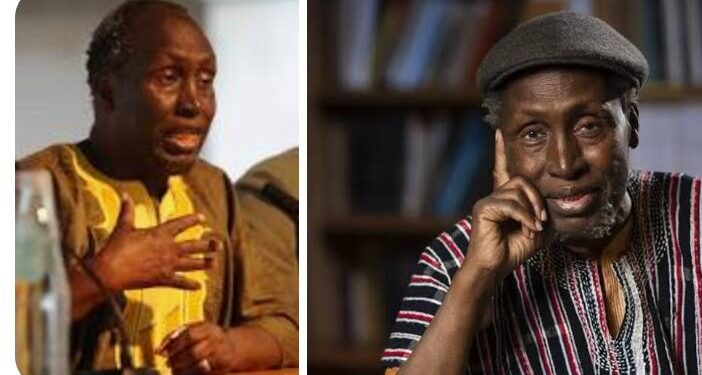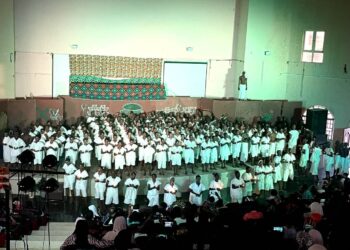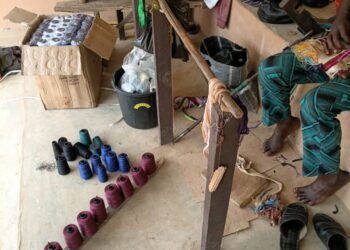By: “Tunji Solomon
WHEN WRITERS die, their death is usually not louder than necessary. His death does not measure his importance. His death is meant for writers to loud and set as agenda. His death would echo beyond his time, while his literary impacts may linger than his personal influence and significant roles in general. This may be hard to differentiate because of the thin line that exists between the variables. It is important to reiterate that he had been a case study, he is still a case study, and he would be a case study in the years ahead, especially on Comparative Literature. Many thanks to the situation that brought him to national limelight before global consciousness of his literary prowess and profiling began.

WITHIN THE context of Weep Not Child and The River Between, Ngugi Wá Thiong’o – the late author,; brought different themes to fore for different purposes, yet, significant beyond their years of publications. The River Between’s them(es) has become recurring issues in many African towns and cities. It dwells on the pains of reuniting neighbours, villages and the pains involved, especially the sacrifices involved, metaphorical and pragmatic.
WHILE THIS writer loves Weep Not Child more than any of his works lies in the fact that it is a work that finds significance in the anonymous joint confrontation and affront against white men during Kenya colonial era. A similar line of theme(s) manifests in Chinua Achebe’s Things Fall Apart, Ayi Kwei Armah’s post independence prose: The Beautyful Ones Are Not Yet Born (while the ugly ones refuse to die); and Zambia Shall Be Free by Kenneth Kaunda (autobiography) among others, testify to Africa being blessed with insightful and visionary writers. Among other works Ngugi gave the word to regurgitate are: A Grain of Wheat, Petals of Blood, Matigari ma Njiruungi, and Wizard of the Crow.
THOUGH THE sole preoccupation of Weep Not Child is on the Mau Mau Uprising, and the lingered seizure of land of the Maus, it is on record that he played his part to end the ancestral land dispossession by any foreigners. Remarkable is the fact that Nguigu’s Weep Not Child claimed the first to get published by any East African author. Like Ngugi, Achebe, Kaunda, Armah, and other African writers that walked the difficult lane of anti-colonialism themes at that time, much thanks to them for their heavy criticisms against colonialism and its traces.
Like THE bitter pills of the junta years in which the like of Wole Soyinka fled Nigeria during Major General Sanni Abacha regime, post-colonial though, Ngugi also suffered certain imprisonment due to Ngaahika Ndeenda – a play he wrote with Ngugi wa Mirii, a sort of huge economic success story. But was dealt a big blow by Kenya dictatorial government with a ban just six week after its debut. He later ran away from Kenya too. He was a prominent Kenyan export when it comes to literary genrie.
LIKE THE writers who were born during the harsh era of colonialism, his fate and life share their fibre with socio-political struggles of the time, May be and may be not, this interfered with his writing life and style. He was a product of British colonial rule when he was born in a rural village of Kenya in 1938, January 5.
THOUGH DEATH and desire are not jolly friends, Ngugi Wá Thiong’o’s exit, permit the euphemism, has enabled him to take a bow and kissed the dust. He left the world to humanity to overseer his works and examine his life posthumously. His journey transcended beyond the willingness to die, but willingness to live after death. His works speak volumes of his nation, national struggles and personal flirt and romance with what life is all about. He came, he saw, he conquered what was within his grasp. There is no doubt about it that Ngugi Wa Thiong’o, occupies a significant place in Africa’s league of writers, critics, scholars and recognised novelists.
IT IS left for Kenyans to immortalise him and raise next generation of Ngugi Wa Thiong’o. Sadly, such writer comes once in hundred years. I pray Kenyans won’t be spectators in the realm of global literary space. The feeling of having a standard representation is deeper than having an ordinary representation. This is not to insult the intelligence of the budding writers of Kenyan origin, but a challenge to walk in the shoes of Ngugi Wá Thiong’o. He didn’t die. His death only sets another agenda for Kenya and Kenyans.
GOOD NIGHT Ngugi WaThiog’o.
Weep not Child.
Weep not my darling,
With these kisses of mine,
Let me remove your tears.
Good night.
You can get every of our news as soon as they drop on WhatsApp ...To get all news updates, Join our WhatsApp Group (Click Here)












